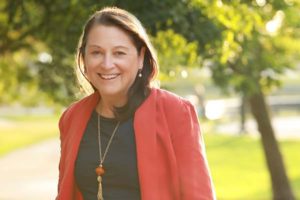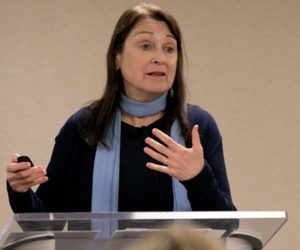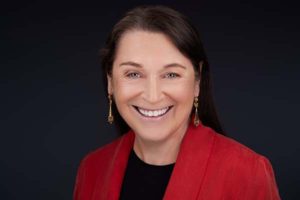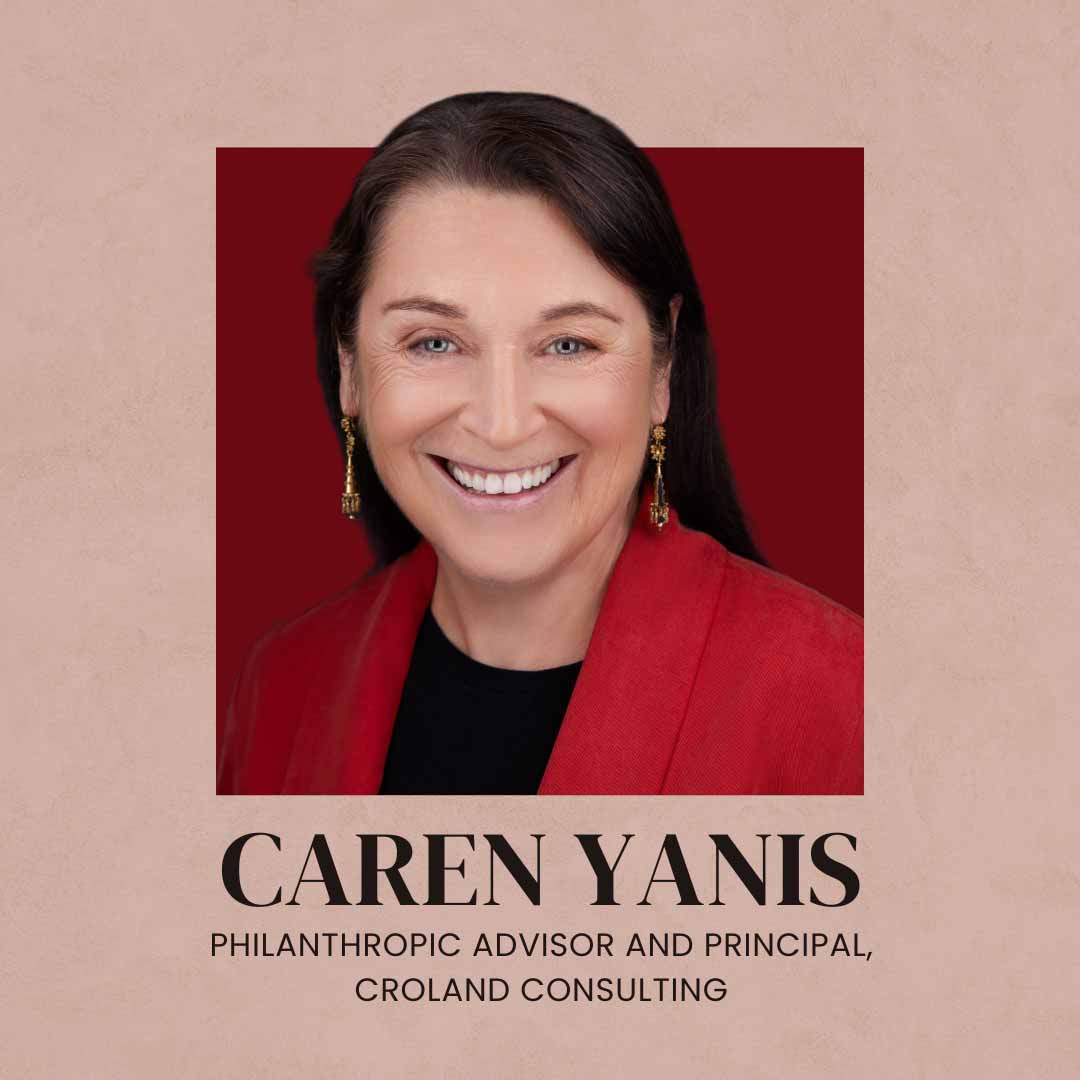CATEGORIES
People We Admire | Social Impact | Women EmpowermentOverview:
- Caren Yanis’s upbringing was rooted in philanthropy, with her parents actively involved in community initiatives to help those in need.
- Her career has always been driven by her passion for philanthropy and belief in the endless opportunities to help others.
- She emphasizes the importance of “being proximate,” meaning visiting sites and understanding others’ perspectives and building connections. These are critical elements of effective philanthropic work.
- Key advice from Caren includes kindness, understanding, and envisioning the purpose behind one’s actions.
1. Could you please share about your childhood and how your experiences shaped who you are today?
As I was growing up I saw my parents raise money and supporting the community. They wanted to understand the challenges people were facing and help. I watched my grandmother make things for mothers and newborns from under-resourced areas, and my grandfather leaning in to support impoverished elderly people.
My father taught me to be curious about other people’s backgrounds and experiences and to listen deeply and observe.
2. You have worked across different fields but all your roles have had a common connection to philanthropy. Can you tell us more about your professional journey and what drives you?
“Entrances to holiness are everywhere”. This quote by Lawrence Kushner has stayed with me as a mantra. “It talks about the endless doors of opportunities the world offers to help others. It’s something that resonates with me on this journey.
I fell into this work. Sometimes I think that there are people who have magnets in their pockets, and they attract other people who want to help or who need someone to listen. I feel like those magnets were sewn into my pockets early on.
It’s especially wonderful to talk with young girls about how they make sense of their experiences and what they do to turn those experiences into a better world for others. I’m grateful to work with people who have social, intellectual, and financial capital—people who think systematically and grandly about ways to help those around them.

3. What are your most important life values—how have they influenced the progression of your career?
It’s important to be able to sit down and have honest conversations and help people get past assumptions and arrive at a place where they’re thinking critically and compassionately. I like to help people talk about goals, purpose, and vision in a way that pushes others to listen.
Being assertive is important, especially for women although it is often diminished as a flaw. Young women need to find their beliefs and convictions and stand by them. I think empathy is an incredibly important skill. It’s a tool that many of us use a lot in philanthropic work. To be effective, you have to understand where the other person is coming from. It doesn’t happen by osmosis—you need to work on it.
4. Have you had any mentors in your journey—how did they shape your worldview and who you are today?
When I was the executive director of the Oprah Winfrey Foundation, the president of Harpo at the time was a man named Tim Bennett. He oversaw everything and taught me the importance of leading from behind.
It was a significant lesson for me. I realized that I no longer needed to tell people what to do. Instead, I began to analyze the problems we aimed to solve, assess our organization’s role in society at the time, and listen to my team members. This enabled all of the team members to have a voice in the activation of our strategic goals.

5. How do you approach communication and storytelling to connect with your audience?
I have spent a lot of time studying religious texts, philosophy, and poetry, and using text to launch critical conversations with people. I teach a lot and I often start with either a poem or a line from a book, movie, or work. I then ask people to think critically about it—what’s right or wrong or its literal meaning. My students get excited when they can think about something that’s not polemic. It’s not political or divisive.
6. What is the most rewarding and challenging thing about what you do?
The most rewarding thing is the joy of seeing people succeed, whether it’s emerging leaders in philanthropy or in global communities of people working to activate solutions to entrenched problems. The most challenging would be the drama and gossip that sometimes come with the profession. I like working with rational people who want to solve problems, even though I know complaining or venting can be a relief at times. I try to set boundaries and create a healthy environment.
An example of one of my most rewarding moments was working with Sabrina Gracias who founded the Ortus Foundation to focus on youth and mental health. At Ortus we found there was very little communication taking place between researchers, practitioners, school administration, therapists, and parents. We created a systematic platform to have open conversations and lead through a holistic approach to elevating youth mental health and activating solutions.
Years ago, I helped Oprah Winfrey build the Oprah Winfrey Leadership Academy for Girls in South Africa. It was an amazing experience navigating the landscape, the culture, and ultimately meeting these amazing young women who just needed an opportunity to excel and then they did.
7. What does your typical day look like?
I wake up early and read or play work and math games to get my brain started. In the springtime, I love to ride a bike or take a walk. Each day is different, but I cherish them all. I love reading; I am currently reading Leonardo da Vinci by Walter Isaacson. Sometimes I read a physical book, sometimes it’s digital, and sometimes I listen. I love adventures, and meeting people who work on the ground to solve problems or just make life a little easier for others. This year I’ve made a couple of dozen trips in the States and have also been in Mexico and Ireland.

8. You mentioned that you have clients navigate the ever-changing philanthropic landscape. What changes are happening in that landscape and how do we know what’s up and coming and overcome that?
One of the books on my list is FutureGood: How to Use Futurism to Save the World by Trista Harris, which talks about geopolitical trends and generational dynamics in philanthropy. I think understanding how different generations internalize events but not keeping generations in the boxes that we often use to identify them is important.
In addition, AI and biotech have a huge impact on the world. For example, how we know cancer today will be totally different from how we will know it 10-15 years from now. That fascinates me.
There are a lot of philanthropic advisors and we bring a variety of skills: some do back-office work, and some focus on governance and strategy. Many are tuned into the issues of our time, like migration, climate change, and health and wellness. Overall, there is a lot of growth in the sector.
9. What’s the best career advice you’ve ever received that you would like to share with others looking to follow your path?
The best advice I’ve ever received is to be kind to others. If someone says or does something that may be seen as offensive, I don’t take things that happen personally. My goal is to understand what’s happening, and in situations that are stressful, to try to diffuse tensions and generate a collaborative environment.
Practicing real love and gratitude is important. I am reminded of an event with Cory Booker, the senator from New Jersey in the States. He’s someone who talks about love in a way that grounds it in action because of the policy work he does and how deeply he’s connected to his constituencies.
Other advice I have is, before you start something, think about your vision and why you want to do it before you jump into it. Being intentional will ground you and guide your actions.
Conclusion:
Caren’s philanthropic journey is rooted in the values of compassion, empathy, and authenticity. She believes in effective communication, evidence based, rational decision making and intentionality in philanthropy, and doing it all with joy.


